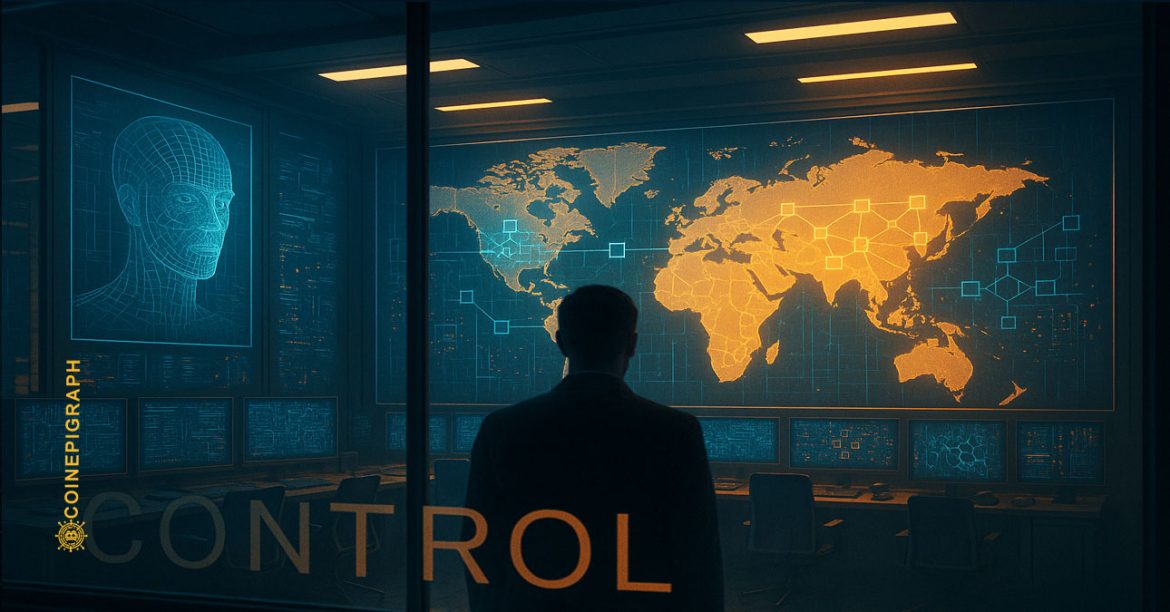By CoinEpigraph Editorial Desk | November 4, 2025
The Premise Shift
While most policymakers and pundits warn of machines rising against their makers, David Sacks, the venture capitalist turned White House AI and Crypto czar, believes the true danger lies elsewhere.
The fear, he argues, isn’t a rogue super-intelligence staging a Terminator-style revolt but the slow, bureaucratic drift toward an Orwellian architecture of control — where AI becomes a tool for surveillance, censorship, and behavioral engineering.
In recent remarks and interviews, Sacks has dismissed what he calls “AI psychosis,” comparing it to the moral panic that surrounded early social media. Instead of panicking over self-aware machines, he urges focus on the human actors programming, training, and weaponizing them. “The real risk,” he said, “is that centralized institutions will use AI to monitor, score, and shape citizens’ behavior.” [Business Insider / Axios, 2025]
From Goldilocks to Governance
Sacks frames the moment as a “Goldilocks scenario.” The world, he says, is neither at the dawn of a utopian productivity boom nor on the edge of extinction. It’s somewhere in between — a narrow band where governments must balance innovation and restraint without tipping into digital authoritarianism.
He warns that over-regulation could entrench power among a handful of corporations already controlling data pipelines and training infrastructure. The paradox: policies meant to “protect society” could instead create a surveillance monoculture, where access to data equals control of truth.
That tension—between innovation and oversight—is now central to the Sacks portfolio. He oversees overlapping initiatives in AI policy and digital-asset frameworks, arguing that both depend on distributed accountability rather than top-down enforcement. The message is clear: decentralization is not just a financial ideal; it’s a civic one.
The Orwellian Lens
To call the AI threat “Orwellian” is to shift the narrative from existential to institutional.
Instead of killer robots, we confront silent algorithms deciding credit scores, parole terms, or geopolitical narratives. Facial-recognition systems fed by state databases, automated compliance tools monitoring transactions, sentiment engines curating political feeds — all form the scaffolding of a soft totalitarianism that requires no dictator, only data.
Sacks contends that these systems, left unchecked, blur the line between security and control.
He often cites China’s social-credit experiments as a cautionary tale, warning that Western democracies could replicate them through commercial rather than political means — via advertising networks, insurance algorithms, or centralized digital-ID frameworks.
The critique resonates in both Silicon Valley and policy circles. Tech libertarians see it as validation; civil-rights advocates see it as overdue realism. For the White House, it’s a balancing act: defending privacy while advancing national competitiveness in the global AI race.
Why Crypto Still Matters
For Sacks, the Orwellian warning also doubles as an argument for blockchain accountability.
Distributed ledgers, he suggests, can serve as institutional counterweights—open audit trails that verify decisions and transactions without revealing private data.
In his view, Web3 infrastructure could be the democratic scaffolding AI never had: immutable records, user-owned identities, machine-verifiable ethics.
Critics accuse him of stretching crypto ideology into AI policy. Yet Sacks maintains that programmable transparency is preferable to programmable obedience. “If we don’t build decentralized verification into AI systems,” he said recently, “we’ll spend the next decade fighting to prove what’s real.”
That logic dovetails with the emerging agentic-economy thesis: autonomous systems exchanging verified data and value across trustless networks. The same cryptographic rails that secure tokens could, in theory, secure truth itself — a necessity in what Sacks calls “the synthetic-reality decade.”
Power, Not Apocalypse
In reframing the debate, Sacks aligns less with science fiction and more with political philosophy. The Terminator fear imagines humans at war with machines; the Orwellian frame warns of humans surrendering to them.
The former is cinematic. The latter is administrative — and already underway.
His argument lands squarely within the CoinEpigraph worldview: technology’s endgame isn’t annihilation, but governance — who builds the systems, who audits the data, and who owns the narrative.
In that sense, the “AI czar” isn’t calming the public; he’s diagnosing the real disease: centralized power disguised as innovation.
The Ledger Beyond the Maze
If Sacks is right, the next decade will not hinge on a breakthrough in machine consciousness but on the quieter contest between open and closed architectures.
The question for policymakers, developers, and investors alike is not “Can AI think?” but “Who gets to decide what it thinks?”
And that, perhaps, is the true maze ahead — one every ledger, algorithm, and citizen will have to navigate.
At CoinEpigraph, we are committed to delivering digital-asset journalism with clarity, accuracy, and uncompromising integrity. Our editorial team works daily to provide readers with reliable, insight-driven coverage across an ever-shifting crypto and macro-financial landscape. As we continue to broaden our reporting and introduce new sections and in-depth op-eds, our mission remains unchanged: to be your trusted, authoritative source for the world of crypto and emerging finance.
— Ian Mayzberg, Editor-in-Chief
The team at CoinEpigraph.com is committed to independent analysis and a clear view of the evolving digital asset order.
To help sustain our work and editorial independence, we would appreciate your support of any amount of the tokens listed below. Support independent journalism:
BTC: 3NM7AAdxxaJ7jUhZ2nyfgcheWkrquvCzRm
SOL: HxeMhsyDvdv9dqEoBPpFtR46iVfbjrAicBDDjtEvJp7n
ETH: 0x3ab8bdce82439a73ca808a160ef94623275b5c0a
XRP: rLHzPsX6oXkzU2qL12kHCH8G8cnZv1rBJh TAG – 1068637374
SUI – 0xb21b61330caaa90dedc68b866c48abbf5c61b84644c45beea6a424b54f162d0c
and through our Support Page.
🔍 Disclaimer: CoinEpigraph is for entertainment and information, not investment advice. Markets are volatile — always conduct your own research.
COINEPIGRAPH™ does not offer investment advice. Always conduct thorough research before making any market decisions regarding cryptocurrency or other asset classes. Past performance is not a reliable indicator of future outcomes. All rights reserved | 版权所有 ™ © 2024-2029.





